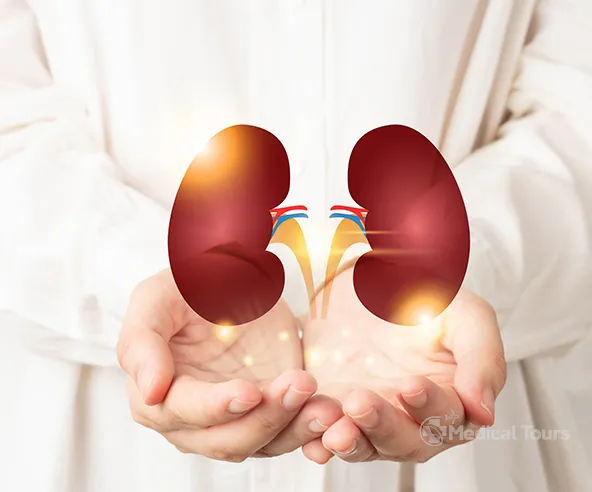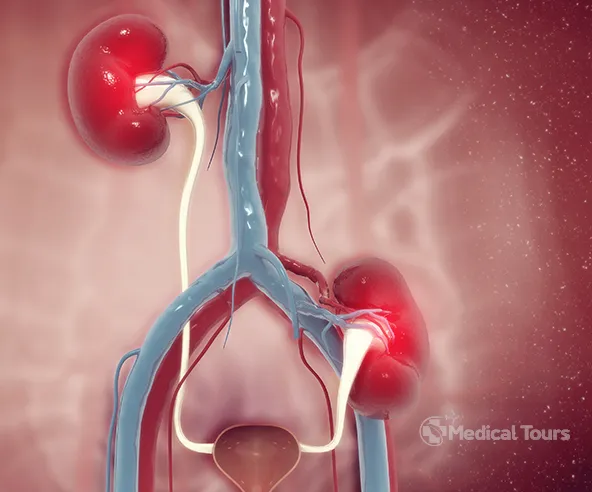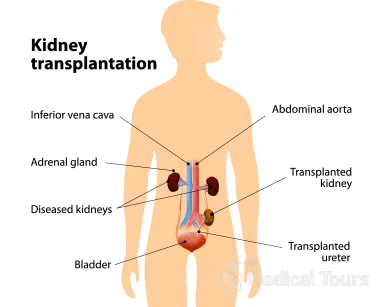Kidney failure is life-threatening and a condition that needs to be treated quickly. It might take months or years before the kidneys completely stop functioning, and during this period patients need prompt medical care to prevent further damage and complications.
Kidney transplant involves a surgical procedure in which the diseased kidney is removed and replaced with a healthy kidney. This can be performed either by replanting a donor's (living or deceased) organ in place of the patient''s kidney, or by implanting a new kidney into the recipient. Kidney transplantation has been called one of the biggest success stories in medical history and has played an important role in extending the lives of millions of individuals around the world.
Your transplant doctor will place the donor kidney in your lower abdomen so that it connects with the artery and vein coming from your own kidney. The ureter is then reconnected to the new kidney, which brings urine from the kidney to your bladder.
Your doctor will do blood tests to make sure you are healthy enough to donate a kidney. These tests include checking your blood and looking for certain antibodies in your system. If you have high levels of the antibody, it means there's a chance your immune system could reject the kidney if it was given to you.
With this service, the doctor can tell you if the bone marrow donor and recipient have similar HLA types. A high match doesn't matter, but it can indicate that there may be a good response to your transplant.
The kidneys are a vital organ in the human body that is responsible for filtering the blood and removing waste from the body. The kidneys are a pair of organs located on either side of the spine, just below the ribcage. Kidney failure is a condition that occurs when the kidneys are no longer able to filter blood. Kidney failure is a condition that can lead to kidney dialysis or kidney transplant.
The symptoms of kidney failure vary depending on how severe it is and what part of the kidney has failed, but some common symptoms include:
There are several causes of kidney failure, most of which are preventable. The most common cause is damage to the kidneys caused by uncontrolled blood sugar in diabetes. Other causes can include inherited conditions, recurrent urinary tract infections and cancerous tumors within the kidneys. Please see your physician if you suffer from any of these symptoms, as an early diagnosis can reduce the chances of requiring a kidney transplant later.
Kidney transplant surgery carries a risk of significant complications, including:
After a kidney transplant, you'll take medications to help prevent your body from rejecting the donor kidney.
There are two types of Organ donation: Live kidney donation and Dead kidney donation. Live Kidney Donation is when a healthy person donates one of their kidneys to another person who needs a transplant. In contrast, a dead kidney occurs when the organ is retrieved from a deceased donor following cardiac death or brain death.
The transplanted organ is well accepted by the recipient's immune system. However, over time, the recipient's own body starts attacking the donor tissue as if it were a foreign invader. To prevent this process from occurring, physicians use immunosuppressive drugs after transplantation to inhibit an immune response.
The overall success of organ donation rests with hospitals in terms of early identification of the donor, and their certification and maintenance. With rising diabetes rates and the prevalence of end-stage kidney disease, the number of people suffering from chronic kidney disease has exceeded 2.5 lakh every year. This makes it necessary for hospitals to continuously monitor donors, as well as certify them on priority basis.
A kidney transplant is a surgical procedure where the diseased kidneys are replaced with the healthy kidneys of a donor. Transplantation is performed when the diseased kidney is no longer able to function properly. The procedure involves removing the damaged kidney, replacing it with a new one, and restoring blood flow to the organ.
During a pre-transplant evaluation, the physician team checks for any comorbid conditions including advanced stage cardiac disease, age, and liver disease that may influence long-term survival rates. Such an assessment may provide essential information to make the necessary changes to the treatment plan for a kidney transplant.
The pre-transplant evaluation is a comprehensive assessment of a patient's health. The care team evaluates a patient for cardiovascular, pulmonary, gastrointestinal, and genitourinary conditions, as well as kidney disease. A physical exam, lab tests, and imaging studies are used to assess each organ system.
During kidney transplantation, the surgeon places the donated kidney in the lower abdomen of the recipient and connects the artery and vein of the donor to those of the body. The transplanted kidney may start picking up urine immediately and begin working within a few hours or sometimes within a few days, but it can take up to a week before this organ works properly.
During an organ wait period, it is important to prevent infection. If the waiting period lasts, Patients on dialysis must undergo regular check-ups in a month, as well as take medication. It is important to keep their weight under check. Hemoglobin levels should be maintained between 10-12 g/dl and blood pressure between 130-140/85-90 mm (about 3.54 in) Hg.
Our country is a global hub of kidney transplant and has one of the highest living donor rates in the world. Hence, kidney transplant in India is performed at affordable costs in most hospitals. The success rate is over 95% when performed by experienced surgeons who are fully accredited in both countries.
Patients with kidney disease must undergo regular dialysis sessions, which can be a repetitive, expensive, and stressful process. The cost of the surgery and other post-operative expenses make foreign patients hesitate to have transplant surgery performed in India. However, we offer you not just low-cost implants at any time but also make sure your treatment is personalized to suit your requirements.
The Kidney transplant cost in India is affordable and varies from city to city. The Kidney transplant price in India starts from USD 7567 (INR 6,00,000) and the complete treatment will cost you around USD 15330 (INR 1600000). However, due to vast competition among healthcare providers several hospitals in India provide advanced treatments at economical rates.
Open nephrectomy is the most common surgery used to perform Kidney transplantation. It is done by making a small incision on your back or side and removing the organ with bare hands. Laparoscopic nephrectomy is done by using a laparoscope (thin tube) to remove the organ. Both surgeries are performed under general or local anesthesia in an operating room, or surgery center. The cost of kidney transplantation varies with different variables such as your medical history, health insurance coverage, surgeon, and other factors.
| Type Of Surgery | Cost |
|---|---|
| Open surgery |
(USD 7567- 15330) INR 6,00,000 to 12,15,737 |
| Laparoscopic surgery |
(USD 15330 - 20000) INR 12,15,737 to 15,86,090 |
Kidney transplant in India is known to be one of the best options for patients who wish to undergo a transplant at an affordable cost. The service quality that you get at hospitals in India is equivalent, if not better than the ones abroad, with similar standards of treatment and services. Reviewed by a panel of experts, we are offering one of the best solutions for kidney transplant surgery in India with outstanding facilities, advanced technology, and individualized care.
Kidney Transplant Cost Comparison in India with other countries:
| Countries | Cost |
|---|---|
| United States | USD 2,00,000 to 4,00,000 |
| United Kingdom | USD 49,000 to 56,000 |
| Singapore | USD 49,000 to 70,000 |
| Canada | USD 28,000 to 35,000 |
| UAE | USD 28,000 to 35,000 |
| India | USD 7,500 to 20,000 |
India is leading the world in kidney transplantation. The best hospitals like Apollo Hospitals, Fortis Escorts, Max Healthcare Private Limited and many more are offering premium quality treatment to the patients. The most advanced technology is available for helping people who need a kidney transplant.
The eligibility criteria for a kidney transplant in India involve the patient being alive (Human Leukocyte Antigen Matching) and having no history of metastatic cancer. Other conditions may not allow a person to be a candidate for a kidney transplant like if he/she has untreated heart disease, active systemic infection, unmanageable physiological condition, and an active substance abuse problem.
Legal documents required for both recipients and donors include: Birth Certificate mentioning the name of the father and mother, I.D. Proof - passport, Consent from recipient, Affidavit from recipient and donor, Local address proof, Passport size photos, Proof of Income stability for the last 3 years and Approval from the home country embassy in India.
Kidney Transplant in India could prove to be an effective and viable solution for patients suffering from chronic kidney disease. It will help them live a healthier life, by addressing the root cause of their problem - renal failure.
In the most common causes of ESRD, the kidneys are injured by diabetes or high blood pressure. However, conditions such as polycystic kidney disease and obstructions in the urinary tract can also lead to renal failure. Some diseases of the immune system have similar effects.
India is the second-largest kidney transplant program in the world. But when it comes to providing affordable, quality treatment, India is second to none. The country has a large network of private and public hospitals equipped with modern medical technologies, the latest medical equipment, and an excellent infrastructure.
A kidney transplant can be a big decision to make. While the procedure is relatively simple and does not carry the same risks of other types of surgery, it is always important for you and your doctor to discuss the pros and cons of this option.


